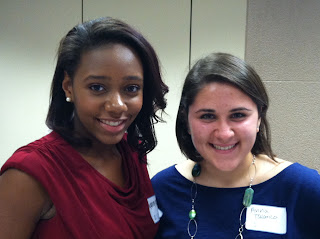Education may be a big theme for Democrats, but there are sharp differences of opinion in the party about how to improve it.
In his acceptance speech in Charlotte Thursday, President Obama asked people to rally around a set of goals "in manufacturing, energy, education, national security and the deficit." Those goals would lead to "new jobs, more opportunity and rebuild(ing) this economy on a stronger foundation," he said.
The president didn't get specific. But two days earlier, Democrats for Education Reform held a panel discussion at Knight Theater to lay out a vision that includes access to high-quality prekindergarten, parent choice, charter-school expansion, teacher accountability based on test scores, mayoral takeover of urban school districts and closure of low-performing schools.
 |
| Alter |
"I believe this decade will be the great period of change for the education reform movement," said moderator
Jonathan Alter, a longtime reporter and analyst who writes for Bloomberg View.
Legislators from Colorado, Ohio and New Jersey spoke about reform bills Alter described as "real success," while he said panelists promoting DFER's reform vision in North Carolina and Indiana are "still in the wilderness."
Colorado Sen.
Michael Johnston, who was an education adviser to Barack Obama's 2008 campaign, talked about helping pass a law that revamped teacher and principal evaluations. Under the new law, at least 50 percent of their ratings must be based on student growth in test scores, he said. He also talked about ending tenure and LIFO, or "last in, first out." Performance, not experience, should determine who keeps their job, Johnston said.
Johnston is co-founder of
New Leaders, a group that's working with Charlotte-Mecklenburg Schools and the public-private
Project LIFT to improve struggling schools in Charlotte.
 |
| Brandon |
N.C. Rep.
Marcus Brandon of Guilford County said he supported the Republican-dominated legislature's decision to lift the cap on charter schools but wanted that bill to include provisions that charters must provide transportation and meals, making the alternative public schools accessible to more low-income families. He said that provision failed because most Democrats and the
N.C. Association of Educators dug in against charter-school expansion.
"Education has been our bread-and-butter issue," Brandon said. "It looks like that's going to slip away because we have been so out of the mainstream."
The presidents of the nation's two big teacher unions, Dennis Van Roekel of the
National Education Association and Randi Weingarten of the
American Federation of Teachers, took part in a second DFER panel about technology and innovation in teaching. Both were in Charlotte for the Democratic National Convention, but Van Roekel said their willingness to talk with DFER doesn't mean they endorse that group's vision.
 |
| Van Roekel and Ellis in Charlotte |
Van Roekel crossed the street to an NEA reception at
Aquavina, where state President
Rodney Ellis was already talking to me about DFER. "We disagree fundamentally on a lot of what they call reform," Ellis said.
Van Roekel said his group prefers to talk about transformation and responsibility, rather than reform and accountability. Their vision involves school boards, administrators, teacher unions and families working together, he said, while the other view devalues teachers and their unions. And he says value-added ratings calculated from test-score data do not create a valid picture of teacher performance. "Use that data," he said. "It just should not be for high-stakes decisions."
 |
| Grundy (left), Sawyer (right) and supporters |
Meanwhile, Pamela Grundy and Carol Sawyer of
MecklenburgACTS, joined by a handful of supporters, stood outside the DFER event and Monday's screening of the upcoming movie "Won't Back Down" carrying oversized foam pencils and taking a stand against "high-stakes testing, relentless charter school expansion, school closings which disrupt families and communities and parent trigger laws." (Read a
previous blog about the movie and accompanying events.)
Grundy and Sawyer were denied admission to both events, even though the DFER session was billed as a "town hall." They had been allowed to register but, after getting mixed signals about whether they'd be allowed in, were turned away. Grundy said they were told they might create a disruption and/or were trying to discourage people from entering.
A DFER spokesperson hasn't responded to my email asking why they were denied admission. It wasn't a matter of capacity; I saw plenty of empty seats in the theater. And the women had been urging people to attend, even if it was to express an opposing view. (
Correction: Found a response in my inbox. DFER says it was an invitation-only event, and even though the MeckACTS folks found a web link to RSVP they had not been invited.)
As reporters well know, being barred can create a better story than the event itself. Grundy
blogged about her experience after being turned away from Monday's screening, and posted on the national
Parents Across America website after the second denial, asking "What are DFER and
Students First afraid of?" That got enough coverage that MeckACTS has a
DNC 2012 media page.
"We were loyal Democrats who were not challenging the Democratic party as a whole," Grundy said in an email Saturday, "just the education policies espoused by DFER and Students First, which the current administration has unfortunately adopted in large part."
.JPG)

















